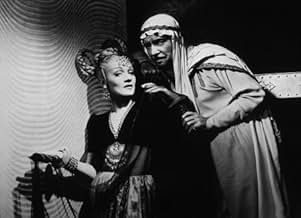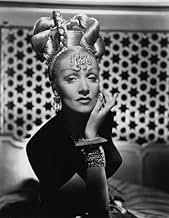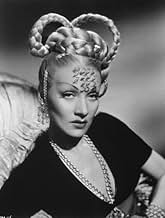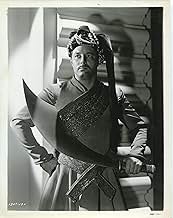IMDb RATING
6.0/10
1.4K
YOUR RATING
In ancient Baghdad, Hafiz the King of Beggars dreams of untold riches and of marrying his daughter to a real prince.In ancient Baghdad, Hafiz the King of Beggars dreams of untold riches and of marrying his daughter to a real prince.In ancient Baghdad, Hafiz the King of Beggars dreams of untold riches and of marrying his daughter to a real prince.
- Director
- Writers
- Stars
- Nominated for 4 Oscars
- 1 win & 4 nominations total
Eddie Abdo
- Aide to Mansur
- (uncredited)
- …
Jimmy Ames
- Major Domo
- (uncredited)
Morris Ankrum
- The Caliph's Messenger
- (uncredited)
Leslie Anthony
- Handmaiden
- (uncredited)
Lynn Arlen
- Handmaiden
- (uncredited)
Noble Blake
- Nubian Slave
- (uncredited)
Carla Boehm
- Handmaiden
- (uncredited)
Dick Botiller
- Aide to Mansur
- (uncredited)
- Director
- Writers
- All cast & crew
- Production, box office & more at IMDbPro
Featured reviews
'Kismet' marked Marlene Dietrich's final concession to Hollywood frivolity before getting into uniform for the sake of war work in Europe by appearing in Metro's version of the sort of Technicolor nonsense Maria Montez was currently making for Universal; albeit with a much starrier cast.
An Arabian Nights fantasy of the type being made back in Germany when William Dieterle was there directing silents (including a couple featuring Dietrich) with remarkably similar production design. Despite Ronald Colman's usual quiet authority in the lead, its most memorable feature has to be Dietrich performing - in the only one of her four scenes lasting longer than a minute - an exotic 'dance' with - as Elkan Allan once described it - "that fabulous body painted gold", owing more to editing than choreography and anticipating Shirley Eaton in 'Goldfinger' by twenty years.
An Arabian Nights fantasy of the type being made back in Germany when William Dieterle was there directing silents (including a couple featuring Dietrich) with remarkably similar production design. Despite Ronald Colman's usual quiet authority in the lead, its most memorable feature has to be Dietrich performing - in the only one of her four scenes lasting longer than a minute - an exotic 'dance' with - as Elkan Allan once described it - "that fabulous body painted gold", owing more to editing than choreography and anticipating Shirley Eaton in 'Goldfinger' by twenty years.
To be bothered by he fact that all the principals of this movies were Western is to miss the point. This is a document of a given time and place (Hollywood in 1944). Ronald Coleman was born to play the part of the poetic beggar prince. Who could be better to declaim the bits of Omar Khayam in the script. It's a little like his take on Francois Villon in "If I Were King". Marlene Dietrich is magnificent as a Macedonian princess in the Grand Vizier's harem. She does a beautiful and seductive dance. Edward Arnold supplies real menace as the heavy just as he did in "Meet John Doe". The whole premise of a movie like this is naive and unhistorical but the production was so ambitious and sumptuous that it transcends that shortcoming.
Often overshadowed these days by the musical version which came a decade later, this film by William Dieterle has the distinction of being one of the best examples of a 1940s Technicolor film there is. And with colour, no one shone out from the screen more than Marlene Dietrich. Here she is as Jamilla, garlanded in gold and looking positively luminous - her appearance in this movie alone would justify watching it.
Ronald Colman, that debonair English actor, plays the role of the beggar, Hafiz (which would be memorably played by Howard Keel in the musical). He's a little starchy and looks prematurely middle-aged, but he was always a very good actor, and here is no exception. James Craig is colourless as the Caliph but Edward Arnold and Hugh Herbert add humour as the Grand Vizier and Feisal.
The strength of this 'Kismet' though it definitely how it looks. It is how the films of the golden era were at their peak, and this version doesn't get shown on TV anywhere near enough.
Ronald Colman, that debonair English actor, plays the role of the beggar, Hafiz (which would be memorably played by Howard Keel in the musical). He's a little starchy and looks prematurely middle-aged, but he was always a very good actor, and here is no exception. James Craig is colourless as the Caliph but Edward Arnold and Hugh Herbert add humour as the Grand Vizier and Feisal.
The strength of this 'Kismet' though it definitely how it looks. It is how the films of the golden era were at their peak, and this version doesn't get shown on TV anywhere near enough.
I've always felt that the technicolor used in the 1940s constituted some of the best color photography ever seen on film. KISMET is no exception. The color is ravishing, with pastel hues for the sets and costumes in interior scenes and ranks with the best color cinematography of any of the '40s films.
Unfortunately, the vehicle itself is weak and Ronald Colman is not the most suitable choice for the role of the scheming beggar. I admire Colman and he uses his speaking voice to marvelous effect but it's hard to see any chemistry between him and Marlene Dietrich, nor does he seem agile enough in the role. She plays the seductive charmer with all of the glamour she is noted for, including a sensuous dance with her famous gams painted gold. Too bad she wasn't given more screen time since hers is the film's most interesting performance.
James Craig had some decent roles in the '40s but here he is totally bland and colorless as the prince that Colman's daughter is in love with--only she knows him as a common gardener. The improbable plot is a thin one but made bearable by the exquisite photography, busy musical background score and some good character actors. Edward Arnold has a major villainous supporting role and seems to be thoroughly enjoying himself.
In my opinion, the '55 musical remake with Howard Keel in the Colman part showed us just how good the role of the beggar could have been if Colman played it more tongue-in-cheek. Keel was more physically right for the role, as well. Unfortunately, Colman always looked on the verge of middle-age in most of his roles, no matter how early the films were!
Trivia: this KISMET was nominated for four Academy Awards: color cinematography, art direction, background score and sound recording. If the Best Costume category had been recognized then, it no doubt would have been nominated in that category too.
Unfortunately, the vehicle itself is weak and Ronald Colman is not the most suitable choice for the role of the scheming beggar. I admire Colman and he uses his speaking voice to marvelous effect but it's hard to see any chemistry between him and Marlene Dietrich, nor does he seem agile enough in the role. She plays the seductive charmer with all of the glamour she is noted for, including a sensuous dance with her famous gams painted gold. Too bad she wasn't given more screen time since hers is the film's most interesting performance.
James Craig had some decent roles in the '40s but here he is totally bland and colorless as the prince that Colman's daughter is in love with--only she knows him as a common gardener. The improbable plot is a thin one but made bearable by the exquisite photography, busy musical background score and some good character actors. Edward Arnold has a major villainous supporting role and seems to be thoroughly enjoying himself.
In my opinion, the '55 musical remake with Howard Keel in the Colman part showed us just how good the role of the beggar could have been if Colman played it more tongue-in-cheek. Keel was more physically right for the role, as well. Unfortunately, Colman always looked on the verge of middle-age in most of his roles, no matter how early the films were!
Trivia: this KISMET was nominated for four Academy Awards: color cinematography, art direction, background score and sound recording. If the Best Costume category had been recognized then, it no doubt would have been nominated in that category too.
Third movie version of popular story involving beggar/magician in Bagdad who impersonates a prince. Meanwhile, the beggar's daughter falls for a camel-boy who's really a prince in disguise! Somehow, Marlene Dietrich gets shoehorned in playing sheltered royalty who rebels by doing a hot dance routine which must've been pretty risqué for 1944 (she's slathered in gold paint). MGM adventure does a nice job rewriting the original play by Edward Knoblock, featuring a colorful production and welcome comedic elements. It's jaunty fun with a fairly fast pace, hindered only by Ronald Coleman's miscasting in the lead (and his surprising lack of chemistry opposite Dietrich). Nominated for four Oscars, including Charles Rosher for his cinematography. Remade as a musical in 1955. **1/2 from ****
Did you know
- TriviaAn uncredited Frank Morgan is the Narrator who introduces the characters and plot at the beginning of the film.
- GoofsRonald Colman's character eats with his left hand, which is taboo in Arabic culture.
- ConnectionsFeatured in That's Dancing! (1985)
- SoundtracksTell Me, Tell Me, Evening Star
(1944) (uncredited)
Music by Harold Arlen
Lyrics by E.Y. Harburg
Partially sung by Marlene Dietrich
Sung by Joy Page (dubbed by Doreen Tryden)
Everything New on HBO Max in September
Everything New on HBO Max in September
We're excited for "Task," a new crime series from the creator of "Mare of Easttown." See everything else coming to HBO Max this month.
- How long is Kismet?Powered by Alexa
Details
- Release date
- Country of origin
- Language
- Also known as
- Oriental Dream
- Filming locations
- Production company
- See more company credits at IMDbPro
Box office
- Budget
- $3,000,000 (estimated)
- Runtime
- 1h 40m(100 min)
- Aspect ratio
- 1.37 : 1
Contribute to this page
Suggest an edit or add missing content





































